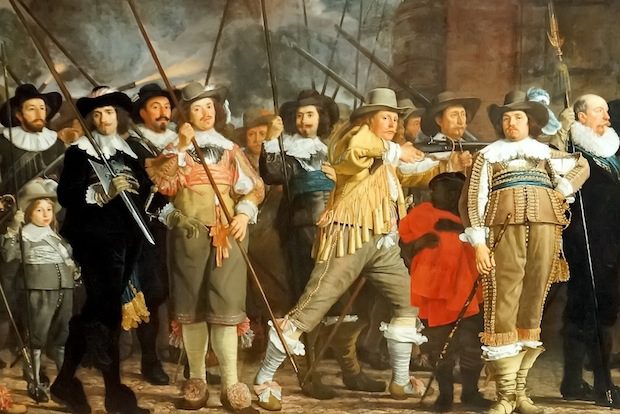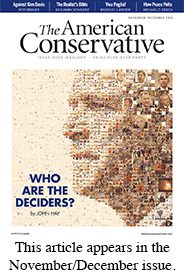Logic of a Modern Militia

Let us say the 2016 presidential election is won by an anti-establishment candidate—Donald Trump? Bernie Sanders?—who knows that the establishment’s national-security policy was made for the 20th century, not the 21st. What might his alternative be?
To fit 21st-century realities, it would have to begin by acknowledging the greatest change in war since the Peace of Westphalia in 1648. That treaty, which ended the Thirty Years’ War, gave the state a monopoly on armed conflict. As laid out in Martin van Creveld’s brilliant book The Transformation of War, published in 1991, the state is now losing that monopoly. All over the world, state armed forces designed, trained, and equipped to fight each other are instead fighting non-state opponents in what I call Fourth Generation war. All over the world, state armed forces are losing.
An American national-security policy designed for an era of this new style of war would have two aspects: security overseas and security at home. Both would look very different from current policy.
Security overseas means avoiding entanglement in Fourth Generation wars. Involvement in conflicts with non-state entities will result in our defeat, as it already has in Lebanon, Somalia, Iraq, and Afghanistan. Not only do America’s armed forces not know how to win such wars, they have little interest in learning. Comfortable with their expertise in reducing the art of war to the mechanics of putting firepower on targets, they do not want to adjust to wars where the moral level is more powerful than the physical level. Nor is Fourth Generation war much good for justifying expensive programs for complex, high-tech weapons.
How do we stay out of non-state wars overseas? By adopting a defensive grand strategy. Instead of trying to give orders to the rest of the world, we would leave it alone, so long as it leaves us alone. We would stay out of other peoples’ business and quarrels. We would still engage with other countries and peoples, but we would do so through private means, trade, and serving as a moral example. That was America’s policy through most of our history, and it served us well. It is tailor-made for today’s world.
That would meet half of the challenge. The other half is preserving security here at home. Keeping our nose out of other peoples’ business will reduce the incentive for them to attack us here. But attacks will still come, both as imports and from groups and causes whose home is America.
 At present, we meet this threat through a continual expansion of the national-security state, to the point where getting on an airplane is like going through Checkpoint Charlie. The national-security state erodes our liberties, it costs immense sums, and it often does not work.
At present, we meet this threat through a continual expansion of the national-security state, to the point where getting on an airplane is like going through Checkpoint Charlie. The national-security state erodes our liberties, it costs immense sums, and it often does not work.
Where it will continue to fail is in countering the “lone shooter,” the person who is motivated by some larger entity but acts entirely on his own. With guns readily and legally available almost everywhere in this country (unlike bomb-making materials), forces that want to strike here can easily work through “lone shooters.” There is no plot for the national-security state to unravel, no group for it to penetrate.
The answer to this challenge again comes from our past. We need a militia that ideally includes all male American citizens. In a world where the state no longer has a monopoly on war, we must return to a pre-state world where every able male is a warrior. The Latin word “populus” originally meant “army.”
Unlike our colonial militias, however, these new militiamen would have neither weapons nor organization. Rather, they would take a pledge that whenever they encounter a “lone shooter,” they will stop him using whatever they have at hand: throwing rocks or chairs, tackling him, beating him unconscious, running over him with their car. If they happen to be armed, fine; if not, they attack anyway.
This summer saw an example of such a militia in action on a train in France, where three young Americans, an airman, a National Guardsman, and a civilian, along with two European men, assaulted and stopped an Islamist “lone shooter.” They acted as American men would pledge themselves to act in the new national militia.
Would some of those swarming a shooter get killed? Probably. As the men on the train said, “We figured we were going to die anyway.”
Liberty requires courage. The national-security state, in which the government tells civilians to hide under the bed while professionals take care of them, demands citizens trade their liberties for false promises of security. The state cannot fulfill that promise against “lone shooters.” The state does not become irrelevant in this new era: we will still need the FBI to investigate wider plots and local police to deal with bombs. We will not need a vast Department of Homeland Security, Pentagon Mk. II.
Together, these two sides of the national-security coin would give us policies that could work in a changed world. Our current approach cannot. That is true across a broad range of issues, not just national security. Perhaps that is why Americans are lining up in droves behind anti-establishment candidates.
William S. Lind is author of the Maneuver Warfare Handbook.
Comments